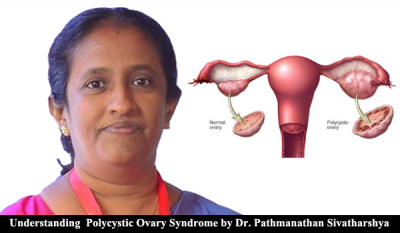Studies conducted in the Gampaha District of Sri Lanka on the subject showed that the community prevalence of polycystic ovary syndrome was at 5.9 percent.
While the condition affects up to 18% of the women in the reproductive ages of 15 to 44, only a very few numbers are aware of their situation leading to undue frustration and stress caused by its symptoms.
Unless diagnosed and treated, this can even lead to various metabolic disorders and weakened social relationships.
However, it is essential to note that if complications are screened and detected early, PCOS is a manageable condition that can be tackled successfully.
Symptoms to look out for
Many affected by PCOS experience a variety of symptoms, brought about the condition’s characteristic effects on the body.
The three main features of PCOS are: irregular periods, excess androgen and polycystic ovaries.
If you have at least two of these features, you can be diagnosed with PCOS.
Signs and symptoms of PCOS often develop around the time of the first menstrual period during puberty.
Sometimes, it develops later; for example, in response to substantial weight gain.
Infrequent, irregular or prolonged menstrual cycles are a quick giveaway too.
For example ,If you have fewer than nine periods a year, with more than 35 days between periods which are abnormally heavy, it warrants a visit to your GP.
Irregular periods are caused by enlarged ovaries that contain numerous follicles (small collections of fluid) which surround your eggs.
This will prevent your ovaries from functioning properly, in some cases leading to infertility.
This is in addition to elevated levels of the male hormone androgen, results in excessive facial and body hair, along with severe acne and male-pattern baldness.
If a person is classified as obese, there is a high chance that the symptoms present themselves more aggressively.
PCOS is often associated with insulin resistance which leads to an increased risk of health problems occurring later in life, such as Type 2 diabetes, high cholesterol levels and high blood pressure.
Diagnosis of PCOS can be made through a detailed medical history of the patient, complete physical examination, blood tests and pelvic ultrasoundscan.
Effect on Mental Health
This complex condition can sometimes have a lasting impact on a woman’s mental health.
People who have been diagnosed with PCOS are about three times more likely to be diagnosed with anxiety and depression than people without PCOS with many reporting severe bouts of anxiety and depression.
It is also associated with an increased risk of obsessive-compulsive disorder (OCD), bipolar disorder, and eating disorders.
A person’s values, lifestyle and the culture among which they live will either ease or aggravate specific symptoms.
For example, the negative stigma attached to the inability to get pregnant in general Sri Lankan culture may lead many women affected by this condition to severe depression.
Overall, many reports feeling frustrated and anxious about their lack of control over their health and bodies.
Is pregnancy out of the question?
PCOS interrupts the normal menstrual cycle and makes it harder to get pregnant.
Around 70-80% of women with the condition have fertility problems.
It can also increase pregnancy-related complications and miscarriages.
But it is important to note that having PCOS does not mean that a person can never get pregnant.
Weight loss and other treatments can improve your chance of getting pregnant since PCOS is one of the most common, but treatable, causes of infertility in women.
Advice to women going through life with PCOS
While PCOS currently has no permanent cure, it is entirely treatable and is a fairly common condition.
If you have PCOS and are overweight, eating a healthy, balanced diet that can lead to atleast a 5% decrease in your body weight which will go a long way in easing one’s symptoms and increasing the effectiveness of medication recommended by your doctor.
Since PCOS is associated with insulin resistance while can lead to Type 2 diabetes, hypertension and high cholesterol levels, patients should be regularly screened for them.
Distressing symptoms such as excessive hair growth, irregular periods and fertility problems can be overcome with medication, so be comforted that you will overcome this condition.
If you find yourself feeling constant anxiety and drifting towards depression, there are many sources of support set up all around the island, so please seek professional help.
You are not alone.
(The writer is Dr. S. Pathmanathan, Consultant Endocrinologist MBBS, MD (Medicine) who is currently working as the consultant Endocrinologist at both Healthy Life Clinic and the District General Hospital Kalutara.)
























